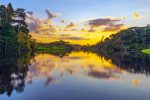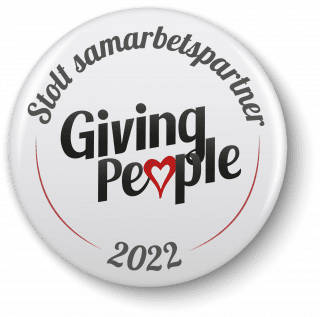In northeastern Ecuador lies Yasuni National Park. The park covers an area of 9,820 square kilometers. It is one of the world’s most biologically diverse regions. The unique and remote position of this national park is the reason for its biodiversity. There are millions of different species of mammals, birds, insects, plants and trees within its boundaries although a large part of the park remains unstudied. About 95% of the national park’s surface is covered by natural vegetation. Anacondas and piranhas can be found in the waters of Yasuni National Park. There are jaguars although they are hard to see…mostly you see birds, insects, monkeys, otters.
Contact form
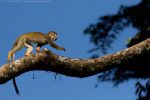
Ecorating: 4.0
This product meets our requirements for Ecorating, a product that is good for humans and the environment.
Does my trip make a difference?
Read more
This product meets our requirements for Ecorating, a product that is good for humans and the environment.
Sample Itinerary
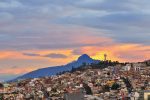
Arrive in Quito and transfer to the hotel.
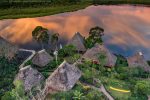
Early morning flight to Coca. Your guide will meet you and take you to the boat towards Yasuni National Park and the NAPO Wildlife Center, a comfortable jungle lodge located in the middle of the rainforest. Here you meet the original population who are your guides and hosts during your time
days here.
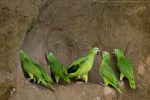
The days here usually consist of boat trips both morning and evening. During this day in the rainforest you will visit the parrots where they lick up mud in a special place. You go by boat deep into the rainforest and of course you also see other things along the way. The parrots visit these mud deposits almost daily because the minerals in the mud counteract the toxins found in the berries and fruit they eat in the jungle. Without the mud, the birds would not survive the toxicity building up in their tiny bodies.
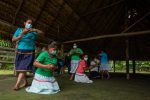
You also visit the cultural center “Kuri Muyu” here you meet local people who share their culture in different ways.
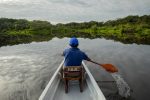
Today the focus will be on nature and animals with a canoe trip, hiking on the Mama Kuna trail and you also get to meet the Anangu Community. In the evening, there will be a traditionally inspired dinner at the end. The Kichua people run the Napo Wildlife and Cultural Center built and designed by this indigenous people in Añangu. The Añangu community has been recognized worldwide for its efforts to preserve the flora and fauna found in this region. The Añangu have given up all hunting and fishing and replaced it with a life based on ecotourism. To keep the place wild and untouched.
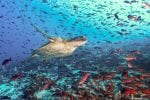
Today, there will again be great contrasts when you leave the rainforest and take the same route back as when you came. Quito awaits for a different kind of adventure. You have your own accommodation and transfers in Quito for the remaining days.
Trip details
Ecorating: 4.0
Season: Year round
Airport: Quito international airport Mariscal Sucre (UIO).
The price includes: 1 night hotel accommodation in Quito, T/R transfer airport, 3 n /4 d accommodation with full board at NAPO Wildlife Center, activities according to program, flight T/R Quito – Coca, T/R boat transport Coca – NAPO.
The price does not include: international flights, meals Quito, additional activities Amazonas, tips, insurances.
Good to know about the Amazon:
Travel etiquette: Always carry a photocopy of your passport with you. Out of respect, ask before shooting. Dress respectfully. Feel free to bring a family photo from home, Ecuadorians are very family-oriented and can open up to nice conversations. Deal with people. Bring small bills, max 20 dollar bills.
Pack: Sunglasses, sun hat, sunscreen, swimwear and shoes
Local currency: USD
Water: Buy bottled water, make sure the bottles end up in the trash. The water quality in taps varies.
Safety: Your safety is our priority. The roads in Ecuador are prone to accidents due to poor quality, which is why we package our trips by air. Crime is worst in the northern parts of Ecuador because proximity to Columbia.

Ecorating: 4.0
This product meets our requirements for Ecorating, a product that is good for humans and the environment.
Does my trip make a difference?
Read more
This product meets our requirements for Ecorating, a product that is good for humans and the environment.
NAPO Wildlife Center
Your visit contributes to local projects and the conservation of 21,400 hectares of tropical rainforest.
The community of Yasuni National park realized that ecotourism is an excellent option for
local development and improved quality of life, at the same time as traditional activities
preserved and, most importantly, to preserve nature.
Wildlife conservation
In this region of very diverse flora and fauna, society decided to give up
their legitimate right to hunt and fish. Thanks to this, nature has been allowed to continue to thrive
here, in contrast to its depletion in other parts of the Amazon.
Solar panels
The implementation of solar panels allows the capture of solar energy. It is stored using a
battery system and then distributed to the various activities performed, regardless of whether
is in the tourism business or for the local community. This system ensures a
reduction in the use of petroleum-based electric generators.
Water treatment plant
Water is treated in a process that passes through various stages and pools to clean
it thoroughly. We give it back to nature cleanly so that we achieve the minimum possible
impact.
Biogas
This project enables NAPO to take advantage of the organic waste which
comes from the Napo Wildlife Center kitchen and dining room to get biogas. This is used
to supply the kitchens, which contributes to taking care of the environment and efficient use of
resources while enabling savings in the purchase of fuel needed for
cooking.
Waste sorting
Hundreds of kilos of plastic, paper and glass are separated and classified at this location to
send them to a facility in the nearest city that recycles the material.
Training
About 120 children from our community and nearby neighboring communities benefit
tourism, with free education from primary to secondary school.
Health center
A small health center is always available with a doctor to treat generals
diseases, and some medicines are available free of charge even to the members of
society.
